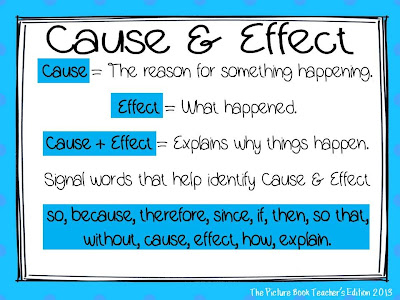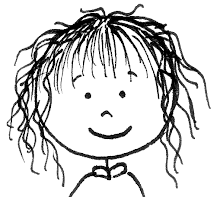“Choices made, whether bad or good, follow you forever and
affect everyone in their path one way or another.”
― J.E.B. Spredemann, An Unforgivable
Secret
Everything in life has a cause and an effect. You study for
a test you get a good grade. You forget your umbrella when it rains, you get
wet. You break a rule you have a consequence.
Kids cause, deal with, and are involved in cause and effect
situations every day, all day long; however, they may not know that they are
dealing with cause and effect.
It is important for students to know and understand what
cause and effect situations are. They should be able to identify an event that
is responsible for the cause that resulted in an effect. Identifying these three things can help
create analytical thinkers and minds that can work through complex problems. It
will also help students socially; they will understand and be more willing to
accept the consequences for their actions –whether good or bad.
People that are good at identifying cause and effect
scenarios and enjoy finding those connections make great investigators (police,
insurance, mechanics) and researchers (doctors, scientists, historians).
Teachers can foster this strategy by giving students ample opportunity to talk and write about WHY? Children are naturally curious and always ask WHY – Why did you do that? Why do fish swim? Why is the sky blue? Why do birds fly?
As teachers, we are the ones that now need to ask WHY?. I think it is quite funny that my favorite questions to ask are WHY questions and my students’ least favorite questions to answer are WHY questions, even though they LOVE to ask their own WHY questions.
Students don’t like why questions because they have to write more than a one word answer, they have to think about the cause and effect and they need to explain how and why they are connected.
Given the opportunity and continued practice students will gradually see the connections and uncover the events, causes and effects that happen all around them. To ensure that students recognize cause and effect and know how to properly answer the cause and effect questions they need to know key words and phrases to help focus their thinking.
Key words to help find cause and effect statements: so, because, therefore, since, if, then, so that, without, cause, effect, how, explain.
These words are key because they will help students to identify
cause and effect questions and statements as well as be able to write sentences that show the
cause and effect relationship.
To immerse your students in cause and effect, teachers should ask questions using question stems so that students get used to the language. For lower students you can give questions that require them to answer with a yes or no answer or they can point to pictures to show the answer. Regardless of the question, each answer must contain text evidence. They must show something from the text that proves their thinking and shows the relationship between the event, the cause and the effect.
Question stems:
·
Did _____ cause _____?
·
Was ____ the cause of ___ or was _________ the
cause?
·
Why did/didn’t __________?
·
Tell me why _____________.
·
Tell me what happened when ____.
·
Why _______________?
·
What causes ________________?
·
How did ___ effect ___?
·
What is the effect of ____?
·
Explain why _________________.
·
Why did _____________?
·
What did ________ do as soon as ____?
·
If you want _____, you should not …
·
Which sentence best tells why ____?
·
According to paragraph ___, when ____ happens,
what happens next?
·
Why do you need _______________?
·
In the passage, how did _____ show _________?
·
What effect did ___ have on ___?
·
According to the text, why ___?
·
What caused the character to ____?
·
In paragraph ___ why did _____________?
·
According to paragraph ___, why _____?
·
Why was the narrator ______?
·
If _____, how would the end of the story be
different?
·
What would have most likely happened at the end
if _______?
Linguistic pattern and response
frames:
·
_____ because _____.
·
______, so _______.
·
The cause is _____________.
·
____ causes _____________.
·
_____ happens because _____.
·
Because ____, ____________.
·
_____, so __________.
·
If you want ____, you should not
____.
·
According to the text, ________.
·
Since _____, _______.
·
You need ______ because ______.
·
In the passage, ____ showed ____ by
______.
·
____
thus, ____.
·
According to the text, _______, thus,
____________.
·
__ made the character _____.
·
In paragraph ____, ___________
because __________.
·
According to paragraph ____, ______,
which led to _______.
·
Due to the fact that ____, ____.
·
________ as a result of____.
·
If ______, the end of the
story______________.
·
Based on ______, _____________.
There can be many causes and effects
that are the result of one event, for example:
When it comes to the cause and effect
from a story it is important to show students all the possibilities. Some cause
and effect examples may be better than others but they are all connected.
For example, take David Goes to School by David Shannon. Here are some example questions that use the question stems above.
Using a multi-flow map you can quickly and easily show the
event, cause and effect connections. For this story, the event is that David
goes to school; the events that connect to this are all the things that happen because
David is at school.
So now that you are armed and ready, you and your students should have lots of fun finding those cause and effect connections. Don't forget to look at and recognize those connections...everywhere!
You can pick up the poster set from my TpT store.
Happy teaching!















Nice post! Very well explained. Cause and effect is one of the most important concepts to teach kids. Using charts is one of the commonly used methods, but your explanations are better. Thanks for sharing. Can you tell us more about other relations as well? Thank you again.
ReplyDeletePaul
ClassroomIQ
Grade any free-response assessment online in minutes!
www.classroom-iq.com
Thank you Paul. If by "other relations" you mean other skills or strategies, I have a few more "The Importance of..." posts with other skills and strategies. If you look under "Labels" in the right hand column you will see a pull down box titled "The Importance of".
DeleteEnjoy your week!
Shawna
Terrific post, Shawna! Thank you for all you share! :)
ReplyDeleteThank you Lorena! I love cause and effect, but it can be so confusing for some.
DeleteEnjoy your week!
Shawna
Great post! Well done and clearly explained. Love the posters and WILL use them this year.
ReplyDeleteThanks Kim! Cause and effect is such an important strategy, I am glad the posters will help you and your kiddos out this year!
DeleteEnjoy your week!
Shawna
I love this post! Thank you for always sharing your thoughts. I love the posters and they are so helpful!
ReplyDeleteYou are wonderful!
Thank you so much for leaving such a positive comment, you made my day! I love teaching cause and effect but it really can be quite confusing for some, so I tried to break it down as simply as possible.
DeleteEnjoy your week!
Shawna
Great post Shawna, thanks for stopping by my blog and commenting last week (Active Readers and Writers). What a great poster set, I need this for my fifth graders. Let me know if you ever want to reciprocal link our literacy blogs. You produce great materials!
ReplyDeleteThis comment has been removed by a blog administrator.
ReplyDeleteThis comment has been removed by the author.
ReplyDeleteI love these posters but I cannot find them on your TPT store! Could you please send me a direct link to them? I want to use them for my formal observation!
ReplyDeleteHi Robin,
DeleteFor some reason they were deactivated in my store. They are now reactivated, here is the link.
https://www.teacherspayteachers.com/Product/Cause-and-Effect-Poster-and-Graphic-Organizer-Set-847357
Good luck on your observation!
Shawna
This comment has been removed by the author.
ReplyDelete